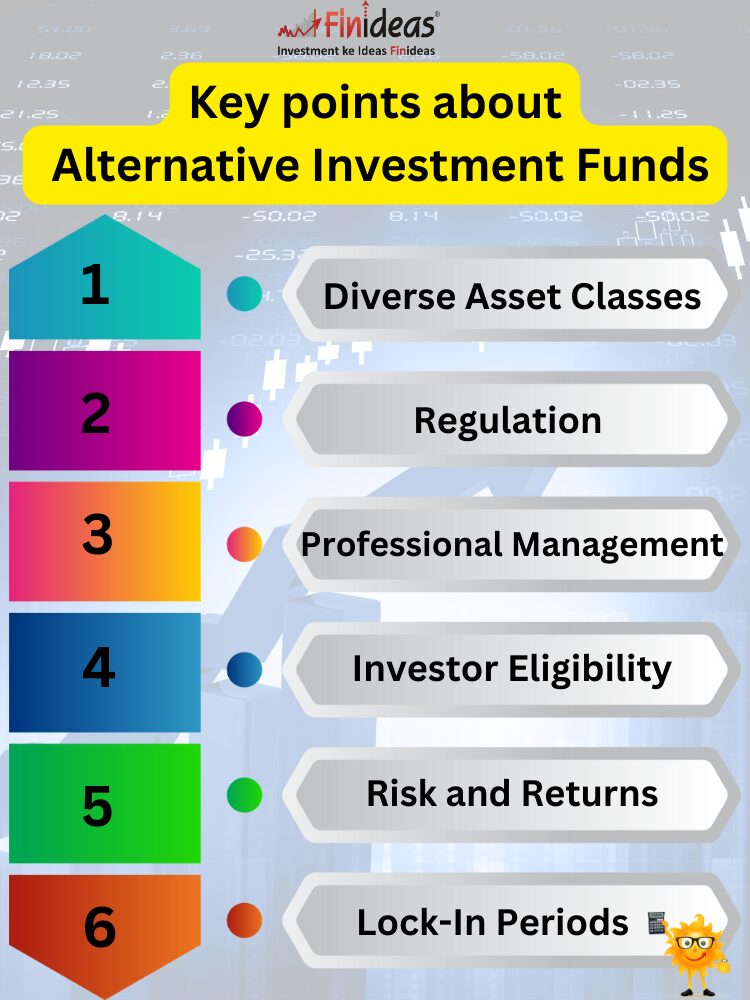A Brief Look Into Alternative investment funds
An Alternative Investment Fund (AIF) is a category of pooled-in investment vehicles that collect funds from investors, whether Indian or foreign, for investing in accordance with a defined investment policy. These funds are distinct from traditional investment funds such as mutual funds, as they invest in assets that may not fall under the conventional categories of stocks, bonds, or cash.
Here are some key points about Alternative Investment Funds:
Diverse Asset Classes:
AIFs can invest in a wide range of asset classes such as private equity, real estate, hedge funds, commodity funds, and more. This diversity allows investors to access opportunities beyond traditional markets.
Regulation and Registration:
AIFs are regulated by market regulators in various jurisdictions. In India, for example, the Securities and Exchange Board of India (SEBI) regulates AIFs. AIFs need to register with the regulatory authority and comply with specified regulations.
Professional Management:
AIFs are typically managed by professional fund managers or investment advisors who make decisions on behalf of the investors. This professional management is expected to bring expertise and knowledge to navigate complex investment landscapes.
Investor Eligibility:
Investing in Alternative Investment Funds (AIFs) is typically restricted to sophisticated and high-net-worth investors due to the unique and often complex nature of these investment vehicles. The eligibility criteria for investing in AIFs can vary based on the regulatory framework of the jurisdiction in which the AIF operates.These funds may have minimum investment requirements.
Risk and Returns:
AIFs, depending on their strategy, can offer potentially higher returns but may also come with higher levels of risk compared to traditional investment options. Investors should carefully assess the risk-return profile before investing.
While alternative investments may be attractive, certain investors might opt for a more cautious approach due to concerns about associated risks. For such individuals, exploring INDEX LONG TERM STRATEGY could be beneficial.
Lock-In Periods:
Some AIFs may have lock-in periods during which investors cannot redeem their investments. This is common in strategies that involve illiquid assets like real estate or private equity.
It’s important to note that the specific characteristics of AIFs can vary based on jurisdiction and the fund’s strategy.
Types of AIFs:
AIFs can be categorized into three broad types based on their investment strategy and target investors. These categories are regulated by regulatory authorities such as the Securities and Exchange Board of India (SEBI) in India:
Category I AIFs:
These funds invest in start-ups, early-stage ventures, social ventures, small and medium-sized enterprises (SMEs), infrastructure, or other areas as specified by the regulatory authority.
Examples: Venture Capital Funds, SME Funds, Social Venture Funds.
Category II AIFs:
These funds do not fit into Category I or Category III and include a broad range of investments. They are not allowed to undertake leverage except for meeting day-to-day operational requirements.
Examples: Private Equity Funds, Debt Funds, Real Estate Funds.
Category III AIFs:
These funds use complex trading strategies and may employ leverage, including through investments in listed or unlisted derivatives. They aim for short-term returns.
Examples: Hedge Funds, Funds of Funds with leverage, Commodity Funds.
Conclusion
Alternative Investment Funds (AIFs) broaden investment horizons beyond traditional assets. Despite potential for higher returns, investors must carefully assess associated risks, varying with fund strategy and asset nature. Professional management and regulatory oversight are critical safeguards. AIFs cater to sophisticated investors, offering diverse opportunities, yet thorough due diligence is imperative.
In navigating the investment landscape, do you prioritize maximizing returns even if it means taking on higher levels of risk, or do you prioritize capital preservation and steady, predictable growth? Share your thoughts below!
Happy Investing!
This article is for education purpose only. Kindly consult with your financial advisor before doing any kind of investment.


